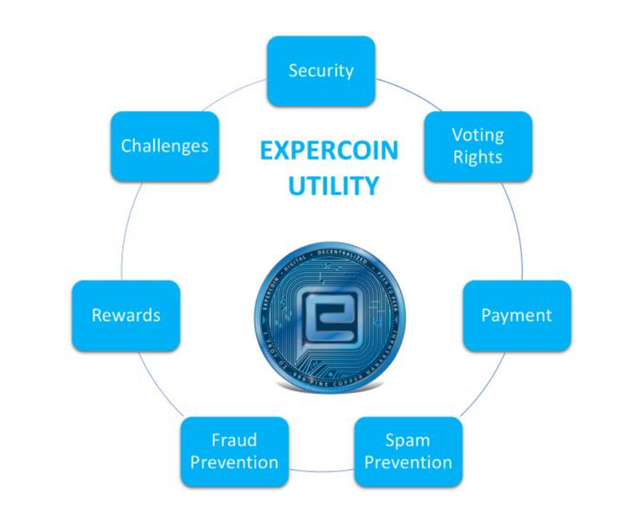A Utilitarian Cryptocurrency Designed to Power Marketplace Economies
Expercoin, Inc. plans on introducing a utility token called “Expercoin,” envisaged as a cryptocurrency that will account for all economic transactions within each Republic and the larger Ecosystem, and it will serve as the basis for interoperability with other digital services built on top of the ecosystem. We intend for Expercoin to be implemented on the public Ethereum blockchain using the ERC-223 token. Wallets are essential to store currencies and transact. Experfy’s existing platform already provides its users a wallet that integrates with Stripe for fiat currencies. It is characterized by ease of use to ensure all interactions are seamless. We aim to bring the same user-experience to the Expercoin “Wallet.”
However, the Expercoin token is more than a payment mechanism. It provides a wide range of functions necessary to create decentralized economy that is not governed by any central authority. Our intent for Expercoin is to allow for voting, governance, fraud adjudication, spam prevention, account verification, and rewards, among others.

Voting to Fight Fraud
As in any online marketplace, a large number of individuals may be deployed to discourage bad actors from engaging in fraud. Companies like Amazon and eBay deploy hundreds of customer service representatives ensure that the items sold by a seller are true representation of what is purported in the item listing. Even if these companies are unable to take preventative measures in identifying fraud, buyers still can dispute the fraudulent transactions with their credit card provider. In the case of payments using a cryptocurrency such as Expercoin, the removal of third-party means that no such recourse is available and a system must be designed to address this issue using economic disincentives.
Expercoin will require a Deposit-Challenge-Vote process to discourage bad actors. Each user when selling a course, posting a freelance gig, filing a complaint, contributing to an assessment, etc. will be required to deposit Expercoin tokens, based on Expercoin Trust Quotient. If the activity is valid, then deposited tokens will be returned to the user. If the activity is invalid or constitutes spam, then the user will forfeit the tokens.

Let’s take an example. A bunch of FinTech geeks have created a “Republic of Blockchain for FinTech.” Imagine Jimmy, a seller, coming to this Republic and listing a course entitled Blockchain for Finance Professionals. Susan, a buyer at Goldman Sachs, comes along and purchases the course for the listed price of $129, only to find that it is a fake course that has nothing to do with either blockchain or finance.
Luckily for Susan, when Jimmy listed the course, he was required to deposit Expercoin tokens equivalent to two times the course price or $258 into escrow to be returned after two successful sales of the course. The amount Jimmy had to deposit was based on his Expercoin Trust Quotient discussed above. Susan challenges the authenticity of the listing by depositing another $129, which is held in a smart contract. To kick off this challenge, Susan provides evidence of why she thinks the course in not authentic. The Republic of Blockchain for FinTech now opens up the issue for voting to all Expercoin token holders. Those voting must also deposit a small amount of Expercoin tokens from their unique wallet addresses. Even though Jimmy tries to game the system by inviting his friends, they are no match for the number of people incentivized to vote by the Expercoin Ecosystem. The voters cast their votes and the matter is decided in the favor of Susan. Jimmy forfeits his deposit of $258 and 50% of this amount ($129) goes to Susan, in addition to her “challenge” deposit of $129. Those voting in favor of Susan also receive a portion of the remaining funds forfeited by Jimmy. All tokens deposited by voters on both sides are returned to them. Expercoin does not penalize the voters of the losing side since wide participation of all users is necessary to ensure the network has strong decentralized self-governance.
A very similar Deposit-Challenge-Vote is used when two parties have engaged in a highly complex transaction and arbitration is necessary. In such a case, all of the users of the Republic are incentivized to become arbitrators and can cast their vote as long as they hold the Expercoin token. Their decision reflected in the voting process is final and binding on all parties involved in arbitration.
Hi! I am a robot. I just upvoted you! I found similar content that readers might be interested in:
https://medium.com/expercoin/expercoin-40e4fafe1e4b
Downvoting a post can decrease pending rewards and make it less visible. Common reasons:
Submit
Glad to be part of this project. I hope the team will continue good job!
Downvoting a post can decrease pending rewards and make it less visible. Common reasons:
Submit
A great result of a strong team and an ever-growing community.Recently, I joined the community, and
I am very glad to be able to contribute my modest contribution to the overall success!
Downvoting a post can decrease pending rewards and make it less visible. Common reasons:
Submit
The idea that manages this project is solid and worthy of praise.
Downvoting a post can decrease pending rewards and make it less visible. Common reasons:
Submit
I really liked what you told me. I found it quite successful. I hope all of what happens here can be done
Downvoting a post can decrease pending rewards and make it less visible. Common reasons:
Submit
thank u very much for your great work. this is really revolutionary project..its promising one. very brilliant future is waiting to Expercoin..
Downvoting a post can decrease pending rewards and make it less visible. Common reasons:
Submit
very cool project and detailed review. i wonderwhen that platform will be on way.
Downvoting a post can decrease pending rewards and make it less visible. Common reasons:
Submit